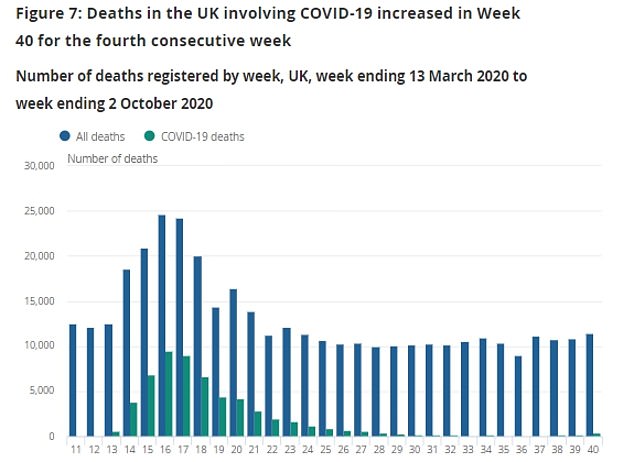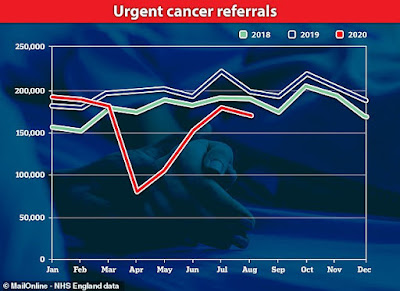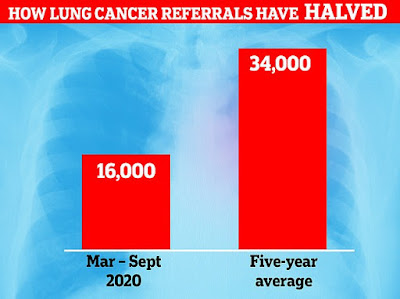The article reproduced below, written by member of SAGE, Professor Robert Dingwall, is, unquestionably, the most comprehensively accurate (and thus, the most devastatingly reproachful) essay critical of the 'LOCKDOWN' narrative published thus far by the mainstream media in the UK.
It remains to be seen how much longer the televisual media will dare to try and prevent such informed opinion from reaching the masses.
Tick tock, #NWO!
Britain must not be sacrificed on the altar of fighting Covid-19, says Professor Robert Dingwall, a government advisor on pandemics!"Boris Johnson, it emerged this week, has finally decided to disagree with Sage, the committee of scientists that seems to have been running our response to the pandemic ever since it became clear we had an international crisis on our hands. They had recommended the return of a full national lockdown of the sort imposed in March, on a temporary basis to halt the spread of the virus.
Such a step would have meant the wholesale suspension of the hospitality trade, closure of outlets such as gyms and hairdressers and a ban on any household mixing. Their advocacy of this so-called 'circuit-breaker' shows how some members of the scientific community have lost their sense of proportion. In essence, they want the entire wellbeing of the nation to be sacrificed on the altar of the fight against Covid. But it ignores the devastating social and economic impact of Covid restrictions, and exaggerates the threat the disease poses.Of course we must seek to save the lives of those seriously affected by the coronavirus, but we must not be so narrow-minded as to forget people suffering from other conditions and the catastrophic effect of our approach on the economy.
Here are the key issues lockdown advocates must take on board... and on which there has been a deafening silence from some of our leaders.
Despite all the hysteria, this is not a modern plague. In the week ending October 2, Covid accounted for just 3.2 per cent of all fatalities in British hospitals. Even with the recent rise in infections, Covid mortality levels are drastically lower now than at the peak of the pandemic in the spring.
On April 8, according to the Office for National Statistics, 975 people died with Covid, compared to 74 last Wednesday. Similarly, in the week ending April 17, 8,758 fatalities were recorded that mentioned Covid-19 as a possible factor on the death certificate. For the first week in October, that figure was just 321. That toll may increase, but it is highly unlikely to reach the levels we saw in spring.
DISEASE OF THE OLD AND VULNERABLECovid-19 is a cruel disease that targets the old or those whose life expectancy is compromised by ill-health. While every life is precious, the average age of patients who die with Covid-19 is 82.4. Since August, just one otherwise healthy person under 30 has died with the disease, while in the same period only 97 victims have been younger than 60.
The average age of people who died from Covid-19 in England and Wales since the pandemic began is 82.4. The data shows how this compares to deaths from other causes.
This pie chart shows the number of deaths that occurred from coronavirus between August 1 and October 2 broken down by age, according to the ONS. It shows only one of the fatalities was recorded in the under 30s age category. Death occurrences are different from registered deaths as not every death in this number will have been issued with a death certificateOne study in June by the Office for National Statistics found 91 per cent of people who died with Covid in England and Wales between March and June had at least one pre-existing condition. This is not to trivialise the virus. Every life is valuable, but Covid-19 deaths are no more or less important than any others.
BETTER OUTCOMESAs knowledge of Covid-19 has deepened, so survival rates have improved significantly. Drugs such as remdesivir and dexamethasone are highly effective in treating the disease, while it is now recognised ventilators can sometimes do more harm than good.For those admitted to intensive care with Covid, the chances of survival have gone up to 80 per cent. Even for the very elderly, contracting it need not be a death sentence.Contrary to the depressing propaganda, six in every seven people who are infected over the age of 90 actually survive.
ICU mortality rates for Covid-19 patients in the 28 days after their admission dropped from 44 per cent to 34 per cent between March and July, data showed earlier on in the pandemic. Fewer people are being admitted to hospital with Covid-19 because the UK squashed the epidemic.
GRIM WARNINGS GO UNREALISED
In their controversial press briefing on September 21, just before the imposition of new pub curfews and rules on mask-wearing, Chief Medical Officer Chris Whitty and Chief Scientific Adviser Sir Patrick Vallance warned Britain could have 50,000 new daily infections by mid-October.Academics claim a two-week 'circuit-breaker' lockdown linked...Though they stressed it was not 'a prediction' but 'an illustration' of what could happen without action, they offered no alternative scenario.Yet we have reached mid-October and their grim warning has, thankfully, been unfulfilled. Over the past week, the rate of infections has averaged just 14,000.
Britain is recording fewer than half of the Government's doomsday prediction of 50,000 cases a day by mid-October, figures show. Professor Chris Whitty and Sir Patrick Vallance made the warning in September in a televised address to the nation
Targeting the hospitality trade, the mix of curfews and closures has been central to the Government's anti-Covid strategy. But in truth there is little convincing scientific evidence to support the belief that these venues are significant arenas of transmission.
This is confirmed by Sage papers, released on Monday, which accepted the economic damage of closures outweighs any potential health benefits. SAGE warned a curfew on pubs would only have a 'marginal impact' - but closing them entirely could slash the R significantly.
PHE data showed infected people were most often coming into contact with family they live with, followed by friends coming to visit them and then people in leisure settings — which include pubs and restaurants
Much of the North and the Midlands has been living with Covid restrictions for months, yet it has not stemmed the rise in positive cases. Revealingly, Chris Whitty stated at Monday's briefing that he did not think even the most extreme Tier 3 crackdown — now imposed in Liverpool — would have much impact.
Much of the momentum behind the recent increase has been driven by the return of students to universities without symptoms — only to be mass tested and told they are infected. But young people are those least in danger. There is not a single documented case of any student this autumn yet dying from Covid.
Given these low risks, it might be counter-productive to curb infections among students since, by contracting the disease, they can boost immunity in their communities.
Yearning for release from the cycle of Covid despair, the public has been encouraged by the Government to pin its hopes on a vaccine. But such faith may be misplaced. The task is not easy. In 40 years, scientists have never found an HIV/AIDS vaccine, nor has one been discovered for the SARS virus in 18 years.
Second, a vaccine may not be a panacea. It will probably be more like an annual flu jab — which will give some protection but not stop you contracting the disease — rather than a measles vaccine, which provides a lifetime's protection. We shall probably have to learn to live with the virus, with nearly all of us infected at some point.
Last week a report by Edinburgh University argued that heavy-handed use of lockdowns and social distancing could cost between 149,000 and 178,000 lives over the course of the pandemic — far more than have died from Covid — by preventing the establishment of herd immunity.
The Edinburgh University study examined various lockdown-style scenarios and found that while lockdown might protect hospitals, they could also prolong the pandemic and prevent the build-up of herd immunity. Pictured: The green and purple lines represent the number of deaths that could occur during a second wave, while the black line suggests deaths would have rocketed during the first wave but stayed low throughout the rest of the year if the country didn't go into lockdown
But the strategy would have put more strain on NHS ICU wards than lockdown did. Pictured: Purple shows how ICU demand per 100,000 would have rocketed if there were no preventative strategies in place. The other lines represent the strain on ICU if other measures were in place, including place closures, case isolation, household quarantine, and social distancing of over 70s
The economic damage caused by lockdowns, curfews and restrictions is becoming ever more apparent. We now face a winter of lengthening dole queues, growing poverty, and mass business failures. Entire sectors of commercial life face wipe-out, from cinemas to the travel industry. Even with Rishi Sunak's 'Eat Out to Help Out' scheme, August growth was sluggish.
Official figures for the fall in GDP during the three months to June have been revised down from 20.4 per cent to 19.8 per cent. However, the scale of the drop still makes it the biggest in modern history
Only yesterday it was revealed that redundancies in the three months to the end of August jumped by 114,000, while between March and September the number of people claiming out-of-work benefits rose 120 per cent to 2.7 million. And the soaring public debt — with the Government likely borrowing more than £350 billion this year — will have be paid by generations to come.
The wreckage to the economy will worsen physical and mental health. Depression, family breakdown and suicide look certain to rise.
Because of the relentless narrow focus by authorities on Covid, other medical conditions are badly neglected. Oncologists warn there could be 50,000 premature deaths from cancer, due to deferred treatments and diagnostic screening failures.
Around 30,700 fewer people with suspected cancer were referred to a specialist by GPs in August 2020 (169,660) compared with August 2019 (200,317) - a 15 per cent drop
The figure is even worse for breast cancer; 9,498 urgent referrals were made in August 2020, down 28 per cent from 13,220 in August 2019. Data was not given for other cancer types.
About 16,000 patients were urgently referred for lung cancer tests in England since March, according to Cancer Research UK. In any given normal year, doctors would expect to see 34,000 referrals for the diseaseThe same pattern is found with other health problems, made worse by a reluctance to attend hospital for fear of being a burden — or of contracting Covid.
It's time for a wider range of ideas and voices to be heard. The question we need to ask is: how can we make the transition to living with this virus, rather than being traumatised by a futile fight against it?"



















No comments:
Post a Comment